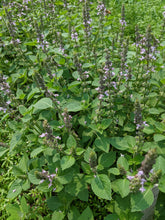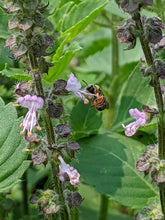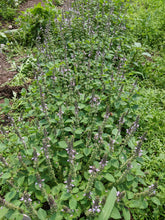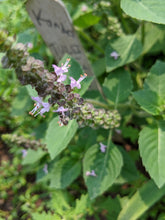'Kondey Island' Tulsi (Huvadhu Atoll, Maldives)
Regular price
$4.25
Sale
Ocimum tenuiflorum
Origin: Kondey Island, Huvadhu Atoll, Maldives
Improvement status: Landrace
Seeds per packet: ~25
BOTANICAL SAMPLE - NOT GERMINATION TESTED
Life cycle: Annual
Tulsi is a really special plant. And this rare variety — from Kondey Island, part of Huvadhu atoll in the Republic of Maldives — is extra special. Also known as "holy basil," tulsi is indeed considered a sacred plant to many Hindus, especially members of the Vaishnavite sect (who consider Vishnu the pre-eminent god). Vaishnavites are also known as "those who bear the tulsi around the neck." At certain times of the year, many Hindus prayerfully light earthen lamps at the foot of their household tulsi plants. If you've ever smelled or tasted fresh tulsi, with its unique sweet and spicy aromatics, it's easy to understand why so many people believe the plant is sacred.
Tulsi is native to South Asia, Southeast Asia, Australia, and the Western Pacific. Far beyond the places where it's considered sacred, it is part of daily health and culinary practices. People drink tulsi tea every day for a range of health problems and as a general tonic. It's also used as a flavoring in Thai cuisine, where it's known as kaphrao, and other cuisines. Tulsi pesto is hard to beat.
We got our stock seeds from this Maldives tulsi from the USDA's National Plant Germplasm System quite a few years ago. It took a few years of growing it to realize that we need to be really diligent about pinching off developing flowers to prevent it from bolting too soon (and thus producing very few leaves and not many seeds either). With frequent pinching off of flowers, 'Kondey Island' (a name we've given to it based solely on where it comes from) will produce plenty of leaves and copious amounts of seed. Our 2023 growout at The Seed Farm at Princeton University yielded our first crop large enough to sell. This tulsi has an especially fruity and appealing aroma. Tulsi has a great deal of diversity — even beyond the well-known "rama," "krishna," "vana" trichotomy — and scientists have only just scratched the surface when it comes to studying their diverse chemical profiles and medicinal/nutritional uses. We don't know yet what exactly sets this tulsi apart from others, but we're hopeful that by making it available someone out there will determine what makes this tulsi so special.
It's well worth mentioning that despite this plant being non-native, we noticed it was a veritable magnet for tiny native bees. As shown in two of the photos here, they seem to really love the nectar and orange pollen of this tulsi.
We are particularly interested in preserving and making available seeds from the Maldives — a country of some 1,200 islands — and other low-lying countries because they're likely to be the first countries to disappear beneath the waves as sea levels continue to rise due to climate change. Though the land-mass of the Maldives is small, they have a long history of smallholder agriculture with countless locally adapted varieties of many crops (including the unique landrace melons from Hithadhoo we have sold off and on for years), all of which are threatened by global warming. The Maldives has played a prominent role in international activism against climate change, particularly under former President Mohamed Nasheed. Under Nasheed, the Maldives announced that they were looking into buying large tracts of land in India, Sri Lanka, and Australia, as climate sanctuaries. President Nasheed said at the time: "We do not want to leave the Maldives, but we also do not want to be climate refugees living in tents for decades."
GROWING TIPS: Start indoors in a warm and sunny spot a few weeks before last frost. Plant seedlings in ground or a container after all danger of frost has passed and once seedlings have a few leaves. Pinch developing flowers off until plant reaches a substantial size to prevent bolting (the pinched off flowers are loaded with goodness, so don't just discard them; they're great for tea, pesto, soup, etc).








